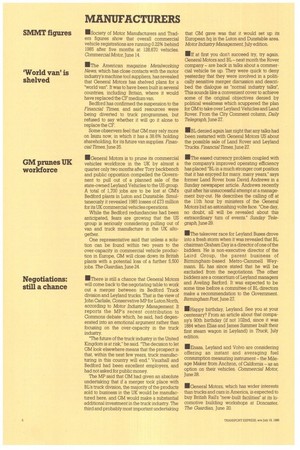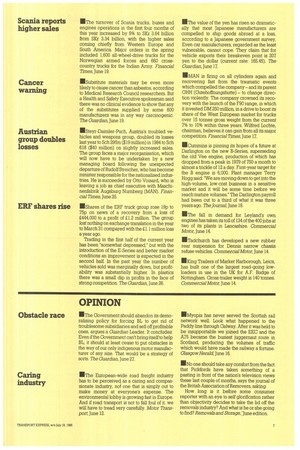MANUFACTURERS
Page 52

Page 53

If you've noticed an error in this article please click here to report it so we can fix it.
MISociety of Motor Manufacturers and Traders figures show that overall commercial vehicle registrations are running 0.22% behind 1985 after five months at 128,670 vehicles. Commercial Motor, June 14.
• The American magazine Metalworking News, which has close contacts with the motor industry's machine tool suppliers, has revealed that General Motors has shelved plans for a "world van". It was to have been built in several countries, including Britain, where it would have replaced the CF medium van.
Bedford has confirmed the suspension to the Financial Times, and said resources were being diverted to truck programmes, but refused to say whether it will go it alone to replace the CF.
Some observers feel that GM may rely more on Isuzu now, in which it has a 38.6% holding shareholding, for its future van supplies. Finan cial Times, June 25, ▪ General Motors is to prune its commercial vehicles workforce in the UK by almost a quarter only two months after Tory backbench and public oppostiion compelled the Governnent to pull out of a planned sale of the state-owned Leyland Vehicles to the US group. A total of 1,700 jobs are to be lost at GM's Bedford plants in Luton and Dunstable. Simultaneously it revealed 1985 losses of £73 million for its UK commercial vehicles operations.
While the Bedford redundancies had been anticipated, fears are growing that the US group is seriously considering pulling out of van and truck manufacture in the UK altogether.
One representative said that unless a solution can be found within two years to the over-capacity in commercial vehicle production in Europe, GM will close down its British plants with a potential loss of a further 5,500 jobs. The Guardian, June 24, • There is still a chance that General Motors will come back to the negotiating table to work out a merger between its Bedford Truck division and Leyland trucks, That is the view of John Carlisle, Conservative MP for Luton North, according to Motor Industry Management. It reports the MP's recent contribution to Commons debate which, he said, had degenerated into an emotional argument rather than focusing on the over-capacity in the truck industry.
"The future of the truck industry in the United Kingdom is at risk," he said. "The decision to let GM look elsewhere means that the prospect is that, within the next few years, truck manufacturing in this country will end." Vauxhall and Bedford had been excellent employers, and had not asked for public money.
The MP said that GM had given an absolute undertaking that if a merger took place with BL's truck division, the majority of the products sold to business in the UK would be manufactured here, and GM would make a substantial additional investment in the truck industry. The third and probably most important undertaking that GM gave was that it would set up its European hq in the Luton and Dunstable area. Motor Indu,stty Management, July edition.
MI If at first you don't succeed try, try again. General Motors and BL next month the Rover company are back in talks about a commercial vehicle tie up. They were quick to deny yesterday that they were involved in a politically sensitive merger discussion and described the dialogue as "normal industry talks", This sounds like a convenient cover to achieve some of the original objectives denied by political weakness which sc-uppered the plan for GM to take over Leyland Vehicles and Land Rover. From the City Comment column, Daily Telegraph, June 27.
MBL denied again last night that any talks had been restarted with General Motors US about the possible sale of Land Rover and Leyland Trucks. Financial Times, June 27.
U ne eased currency problem coupled with the company's improved operating efficiency has placed "BL in a much stronger cost position that it has enjoyed for many, many years,' says former Land Rover boss David Andrews in a Sunday newspaper article. Andrews recently quit after his unsuccessful attempt at a management buy-out. He describes the calling off at the 11th hour by ministers of the General Motors bid an astonishing volte face, "One day, no doubt, all will be revealed about this extraordinary turn of events." Sunday Telegraph, June 29.
• The takeover race for Leyland Buses drove into a fresh storm when it was revealed that BL chairman Graham Day is a director of one of the bidders. He is non-executive director of the Laird Group, the parent business of Birmingham-based Metro-Cammell Weymaim. BL has since stated that he will be excluded from the negotiations. The other bidders are a consortium of Leyland managers and Aveling Barford, It was expected to be some time before a committee of BL directors make a recommendation to the Government. Birmingham Post, June 27.
• Happy birthday, Leyland. See you at your centenary? From an article about that company's 90th birthday (if not 102nd, since it was 1884 when Elias and James Summer built their first steam wagon in Leyland) in Truck, July edition • Enasa, Leyland and Volvo are considering offering an instant and averaging fuel consumption measuring instrument the Mileage Maker from Andiron, of California as an option on their vehicles. Commercial Motor, June 28.
MIGeneral Motors, which has wider interests than trucks and cars in America, is expected to buy British Rail's "new-built facilities" at its locomotive building workshops at Doncaster. The Guardian, June 20. • The turnover of Scania trucks, buses and engines operations in the first four months of this year increased by 9% to SKr 3.64 billion from SKr 3.34 billion, with the higher sales coming chiefly from Western Europe and South America. Major orders in the spring included 1,600 all-wheel-drive trucks for the Norwegian armed forces and 660 crosscountry trucks for the Indian Army. Financial Times, June 19.
• Substitute materials may be even more likely to cause cancer than asbestos, according to Medical Research Council researchers. But a Health and Safety Executive spokesman said there was no clinical evidence to show that any of the substitutes supplied by some 600 manufacturers was in any way carcinogenic. The Guardian, June 19.
• Steyr-Daimler-Puch, Austria's troubled vehicles and weapons group, doubled its losses last year to Sch 295m ($19 million) in 1984 to Sch 618 ($40 million) on slightly increased sales. The group faces a major reorganisation, which will now have to be undertaken by a new managing board following the unexpected departure of Rudolf Streicher, who has become minister responsible for the nationalised industries. He is succeeded by Otto Voisard, who is leaving a job as chief executive with Maschinenfabrik Augsburg Nurnberg (MAN). Financial Times, June 25.
• Shares of the ERF truck group rose 19p to 75p on news of a recovery from a loss of £444,000 to a profit of £1.2 million. The group lost nothing on exchange translation in the year to March 31 compared with the £1.1 million loss a year ago.
Trading in the first half of the current year has been "somewhat depressed," but with the introduction of the E-Series and better market conditions an improvement is expected in the second half In the past year the number of vehicles sold was marginally down, but profitability was substantially higher. In plastics there was a small dip in profits in the face of strong competition. The Guardian, June 26. • The value of the yen has risen so dramatically that most Japanese manufacturers are compelled to ship goods abroad at a loss, according to a Japanese government survey. Even car manufacturers, regarded as the least vulnerable, cannot cope. They claim that for vehicle exports their breakeven point is 207 yen to the dollar (current rate: 165.45). The Guardian, June 17.
INMAN is firing on all cylinders again and recovering fast from the traumatic events which compelled the company and its parent GHH (Gutehoffnungshutte) to change direction violently. The company crowned its recovery with the launch of the F90 range, in which it invested DM 250 million, in a drive to boost its share of the West European market for trucks over 15 tonnes gross weight from the current 7% to 10% within three years. Wilfred Lochte, chairman, believes it can gain from all its major competitors. Financial Times, June 17, • Cummins is pinning its hopes of a future at Darlington on the new B-Series, superseding the old Vee engine, production of which has dropped from a peak in 1979 of 750 a month to almost a trickle of 12 a day. First-year target for the B engine is 6,000. Plant manager Terry Hogg said: "We are moving down to get into the high-volume, low-cost business in a sensitive market and it will be some time before we reach mature volumes." The Darlington payroll had been cut to a third of what it was three years ago. The Journal, June 18.
INThe fall in demand for Leyland's own engines has taken its toll of 134 of the 400 jobs at two of its plants in Lancashire. Commercial Motor, June 14.
INTadchurch has developed a new rubber rear suspension for Dennis narrow chassis refuse vehicles. Commercial Motor, June 14.
• King Trailers of Market Harborough, Leics, has built one of the largest road-going lowloaders in use in the UK for A.F. Budge of Nottingham. Gross trailer weight is 140 tonnes. Commercial Motor, June 14.




































































































